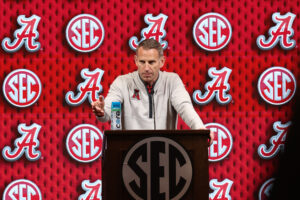Birmingham’s favorite son Bobby Bowden reflects on Deion Sanders, Steve Spurrier, THE U, Bear Bryant, political correctness, and the faith that’s carried him through the years
By AL BLANTON
Shorty White leaned up against a streetcar and watched Ann Estock prettily ascend the steps in her heels and long, white dress. Shorty thumped his toothpick to the ground, slung himself around the railing, and hopped inside. It was the fall of ’48, and the pair were headed to see a picture show in downtown Birmingham. Life was good. Ann’s “steady”—unaware of these pleasantries—was fifty miles away in a dorm room in Tuscaloosa.
Two days later, Paul Crumbley informed the steady—who eventually grew up to be a pretty dadgum good football coach—about the unusual pairing on the streetcar.
“Bobby, you not goin’ with Ann anymore?” inquired Paul.
“Yeah boy, we’re still steady. Why?” said Bobby.
“Well, I saw Ann this weekend with Shorty White.”
“What? You’ve gotta be kiddin’ me? Shorty White?”
“Yessiree. I saw the both of them on the streetcar together!”
“I couldn’t stand it,” says Bobby Bowden now, sixty-six years later. “I couldn’t stand the thought of Ann being with someone else.”
The reason why Ann was with someone else was that Bobby and a few buddies (including Shorty) had slipped off to the Promised Land—Panama City, FL—for a few days that summer and had gotten friendly with a few of the girls. That fall, when Ann found out about the festivities, she wasn’t happy.
Bobby, maintaining his innocence, begged his case to Ann. Ann forgave him, and ol’ Shorty was quickly out of the picture.
Bobby knew he wanted to marry Ann but there was one problem. It was orthodox law at Alabama that you couldn’t be on a football scholarship if you were married, and Bobby had come to Alabama to play quarterback. So he was faced with a choice: stay in school in Tuscaloosa, or move back home to marry Ann.
The rest is history.
When Ann and Bobby eloped in April of ’49, they found a preacher to marry them just outside of Rome, Georgia. When the preacher opened the door, he was eating a piece of fried chicken.
There have been two things consistent in Bobby Bowden’s life. His marriage and his faith. Even with as much success as he’s had on the football field, not all of his seasons produced winners. At West Virginia in 1974, he went 4-7. At Florida State in ’76, he went 5-6. He lost to Miami 20 times. He lost to Florida 18 times.
Bowden has won a lot, too. He holds the record for most wins in college football (377), he won 22 bowl games against 10 losses, 12 ACC championships, and his Seminole teams ranked in the top five for 14 consecutive years. In the 1990s, FSU went 109-13 with national championships in 1993 and 1999. Across six decades, he won over 74 percent of his games. That’s considered great by today’s standards. A man who has found that kind of success shouldn’t have to worship anything, right?
Wrong.
Bowden, a devout Christian, worships a being whom he believes is more than 74 percent right. Call it hokey. Call it old-fashioned. Bowden simply believes the Bible, and he believes God. You see, the pair made a deal together a long time ago when Bowden was stricken with rheumatic fever as a young boy.
“God, if you will heal me, I promise I’ll serve you the rest of my life,” he said.
It was a classic example of a foxhole prayer–only Bobby meant it. He has kept that promise and has shared the Gospel of Jesus Christ with every player that has ever walked through the broad gates of Bowdenland. “I just felt like God was the number one priority,” he says. “I was going to do what He wanted me to do. What He put me here for. God created us. And He has a purpose for us. My purpose was to serve Him, using the Bible as my foundation.”
It’s not braggadocios; he says that he simply did what he felt called to do.
The Bobby Bowden Story is a tale of deep moral fiber, commitment, hard work, and the refusal to back down from a challenge. If the Bible were written in today’s world, Bowden’s story is perhaps most akin to David’s. Like David, Bowden is not a large man in terms of physical dimensions. His weapon was not a slingshot, but rather a flaming spear. While service to the Almighty could have occurred in a variety of arenas, Bowden’s threshing floor was the American football field, slaying tiger and gator, battling hurricane. Here’s how it all went down:
Woodlawn
Bowden grew up in the Woodlawn section of Birmingham during the Depression, and the first sounds he remembers were the popping of leather helmets just beyond his backyard. “My house backed up to a field, and there was an alley—did y’all have alley?” Bowden says. “There were some big bushes, but on the other side, I could hear them practicin’.”
“Them” was the great Woodlawn football team, with stars like the gallant, near-immortal Jimmy Tarrant. “My dad would get on top of the garage, and I’d climb up the ladder with him and watch practice,” Bowden recalls.
Eventually, the family moved to the Eastlake community. Fortuitously, the house was at the bottom of a hill, just below Howard College’s football field. “We’d go over and play on the tacklin’ dummies and climb on the goalposts,” Bowden recalls.
Bowden, an avid radio listener, was fascinated with Frank Thomas’s Red Sea of Tuscaloosa and Frank Leahy’s Catholic boys of South Bend, Indiana. Dreams of playing football for these teams began to dance in young Bobby’s mind, so he suited up for Woodlawn in hopes of one day making it to the big time.
But that was before Ann Estock appeared in his life.
Howard
After leaving Tuscaloosa, Bowden enrolled at Howard College (now Samford University) and played quarterback and halfback on the football team. He stayed at Howard and served as assistant coach for two seasons (’54-’55) before landing his first head coaching job at South Georgia College in Douglas, Georgia.
In 1960, he returned to Howard as the head coach where he established a reputation as a hard-nosed instructor with his “mini-Junction” practices conducted in Cook Springs, Alabama, where conditions were Spartan and water was a rare commodity (summer letters “fudged” on the swimming and fishing possibilities).
“That swimmin’ pool was filthy,” Bowden laughs. “We’d practice three times a day.”
Bowden’s Howard boys directly benefited from the indefatigable coach’s web of networking. He would often slip over to Tuscaloosa to catch practice under Bear Bryant, or spend a few minutes picking assistant coach Gene Stallings’s brain. Bowden even convinced Green Bay Packers and former Alabama quarterback Bart Starr to help out for a spring.
“Shug Jordan and Bear were my big heroes,” says Bowden.
Rising in the Ranks
In ‘63, after getting introduced to Coach Bill Peterson at a Touchdown Club meeting in Atlanta, Bowden was hired to coach wide receivers at Florida State, where he developed future NFL Hall of Famer Fred Biletnikoff. He took the offensive coordinator job at West Virginia in ‘66, eventually becoming their head coach in 1970.
Bowden cites the Pittsburgh game in ’70 as the “Job” Moment of his career. Trailing 35-8, Pittsburgh rallied in the second half to defeat the Mountaineers 36-35. “That was my worst loss in coaching,” he says, even with “Wide Right” I-IV to consider.
The ’74 campaign saw the walls of Jericho come tumbling down (in a bad way), as the Mountaineers descended to a low altitude of 4-7 with Bowden’s image being hung in effigy. But even with all the negative flak, Bowden says that he still had the confidence of WVU administration.
“They didn’t fire as quick back then,” he laughs.
Bowden turned things around in ’75—a Damascus Road year—going 8-3 and securing a Peach Bowl win against N.C. State.
“I couldn’t stand losing,” says Bowden. “Losing hurts more than winning feels good. But my faith saw me through. If we got beat, I knew that God was still in control.”
Florida State lured him back to the South in 1976, and he served there for 34 years until his retirement in 2009.

When Bowden arrived at Florida State boasting sideburns and polyester, the Seminoles had performed pitifully in the two seasons under Coach Darrell Mudra (4-18). Making matters worse, games with Nebraska, Ohio State, Notre Dame, Pittsburgh, and LSU—a “Murderers Row” of away games—loomed in the future. Never flinching from a challenge, Bowden instead used this brutal scheduling to his advantage, growing Florida State into a national powerhouse by marching into cathedrals far and wide, where he fussed with the titans of the world.
The key? Recruit, recruit, recruit. And my, could he! Consider this: an aging folksy Baptist swayed players like Deion “Prime Time” Sanders–who would go on to have more rings than a Mafia Don– to Florida State University. How did he do it?
“I just tried to be myself,” says Bowden. “In a recruiting visit, I’d try to talk about everything but football. I’d say, ‘Come to Florida State where the sun is always shinin’ and the beaches are 25 minutes away!’ And I’d tell their parents I was going to take them to church.”
And it worked! Deion Sanders. Michael Boulware. Warrick Dunn. Charlie Ward. Darnell Dockett. Peter Tom Willis. Ron Simmons. Just to name a few.
“Deion was the best athlete I ever coached,” says Bowden. “His last year at Florida State, he signed with the Yankees and lived in his own apartment. But the players loved him because he practiced, sweated, and suffered with them.”
Often, across the recruiting table were Bowden’s in-state nemeses, Florida and Miami. These two dissimilar rivals would prove to be a perpetual thorn in Bowden’s side. The difference?
“We got along with Miami,” says Bowden. “We didn’t get along with Florida. Florida is the prestige job of the state, especially in terms of resources. But my relationship with [Steve] Spurrier is good. The press tries to make it sound like its not. I have the utmost respect for him.”
If there were no Florida or Miami, one might wonder how many national championships Bowden could have won. “If we’d have kicked the ball straight, we’d have won more,” Bowden grumbles. Perhaps the fact that he played such fierce games says more about the man than whether or not he won them all.
Bowden will admit that his initial “life goal” was to coach at Howard, but his life became an example of God’s bigger plan (Think: “Now to him who is able to do immeasurably more than all we ask or imagine, according to his power that is at work within us…. -Ephesians 3:20). That “immeasurably more” includes becoming one of the greatest college football coaches of all-time, impacting thousands (millions?) of people for Christ throughout his life.
So why did God lead a Birmingham boy to Florida State?
“Well, look at all that’s happened!” Bowden says.
His few “sins” include a jonesing for chocolate, and a small golf addiction. He watches The Military Channel and enjoys books on World War II. He loves music—“In my car, I get all the songs. But I like the ‘Big Bands’ of the 40s and 50s.”

At Home
In his white-carpeted parlor at his home in Tallahassee, Florida, remnants of his coaching days are strewn throughout the room. A coaches award here. Framed game programs there. Books are heaped neatly on a coffee table and a few trinkets rest on a sideboard. A black folding screen with Japanese images juxtaposes the rose-and-white themed room. A placard reading BOBBY BOWDEN on his small antique desk hails the old Seminole logo—the open-mouthed Chief Osceola with a ribbon of war paint arcing across his cheek.
Behind that placard are three cards. Two of them are sketches of Jesus; the other is the famous European-looking Jesus painting that graces so many living rooms and churches throughout America.
Bowden understands that these cards depict something that will never turn to rust and dust—unlike trophies, awards, and even championships, which so often have a tendency to do. It matters more than whether or not a ball went wide left or wide right, or went straight down the middle. It matters more than wins and losses, or whether or not Florida State beat Florida this year.
Because Bowden was a small player, he often had to develop trick plays to gain an edge on his opponents. He often used that same strategy when he was coaching, employing the patented “Fumblerooskie” when necessary. Bowden will submit that the only strategy he used in his personal life was following Christ, a way of life that he first learned at Ruhama Baptist in Woodlawn, Alabama.
“I’d rather be spiritually correct than politically correct,” he once said.
Spiritually correct often means demonstrating faith, showing grace and mercy, and offering forgiveness.
Even to Shorty White.
“Woo boy!” Bowden howls. “Yeah. I’ve forgiven him.” Talegate
Article originally published in 78 Magazine in 2014.








